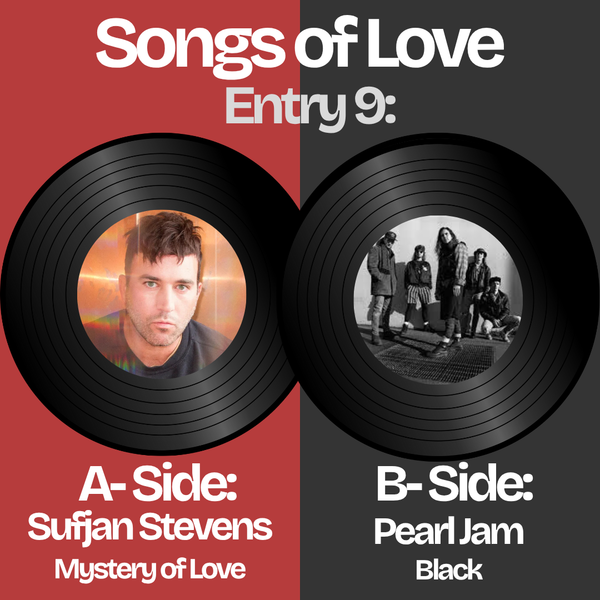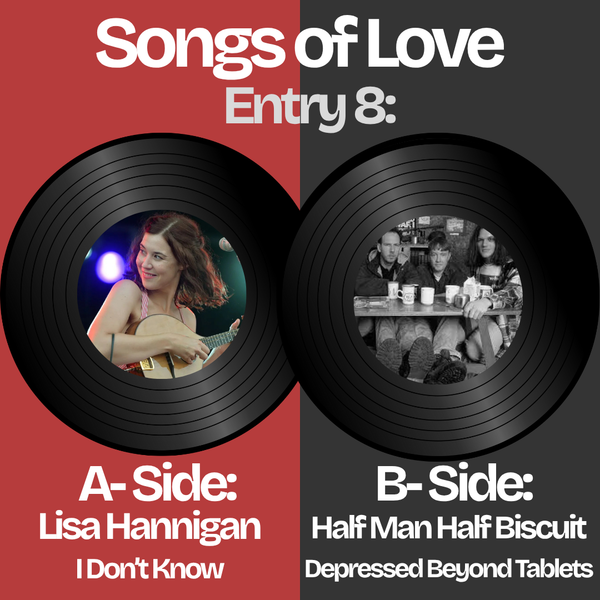Songs of Love 5
Performance is everything on all of these records, of course. These aren’t poems, they’re songs, and they demand to be experienced and analysed as such, as holistic pieces of art wherein the distinct parts come together. But this entry in particular capitalises on the distinct sounds and moods of these two tracks; one a Motown classic, the other a sombre mid-80s goth dirge. Both brimming with emotional intensity, but that intensity is shown and released in very distinct ways. Not least through the very different personae and performances of the respective lead singers.
A-Side
Performed by the Four Tops
Written by Lamont Dozier, Brian Holland and Eddie Holland
Released 1966
Levi Stubbs does not, as a rule, come across on Four Tops records like a man who brooks any argument. There’s a forcefulness to his vocal – “Now if you feel that you can’t go ON”[1] - that feels like the musical equivalent of slamming his hand down on a table. He’s not taking any nonsense. He wants to make absolutely certain you know that he’s there for you, and he will not accept any equivocation or denial on that point. It’s the sort of vaguely aggressive kindness that can be quite alarming, but is often necessary in dealing with someone who isn’t great at looking after themselves.
It makes for a nice contrast, actually, in some ways. Around this period, the Tops and Holland/Dozier/Holland had developed a real vogue for vaguely gothic songs of manic intensity – ‘Bernadette,’ ‘Standing in the Shadows of Love’ – in which Stubbs sounds like a man driven to the edge, a sort of Heathcliff figure in thrall to a woman beyond his reach. Here, though, that same wide-eyed intensity is driven towards positive ends, as if Heathcliff turned up on Cathy’s doorstep to wish her well in her marriage and offer his unconditional support. I always visualise it as a kind of trust fall dynamic, with Stubbs standing behind his lover and shouting about how he is there to catch them (and if they don’t get the message, his wingmen Duke Fakir, Lawrence Payton and Obie Benson are there to immediately repeat it, presumably in a sort of Bohemian Rhapsody-esque diamond formation behind him).
And yet for a song about unconditional support, it’s not especially soothing. Again, it’s that forcefulness that really shines through. As Chris O’Leary writes, the song’s “salvation is hectoring, as if the only chance he can get through is to give the other no chance to respond.”[2] But that strength may also just be matching the depths of despair into which the singer’s lover has fallen, in which “happiness is just an illusion” and the whole world seems to be crumbling around them. With that kind of world-weariness, and especially when it’s arising out of “confusion,” what could be better than to have someone not only to reassure you, but also be a pillar of strength, holding up the world around you like Atlas?
And yet. I’ve been referring to the person to whom the song is addressed as the singer’s “lover” so far for ease of reference. But that’s not quite what’s going on here. On the contrary, they’re “all on your own”, with no “hand to hold;” in the final verse, they’re explicitly “not in love.” So this isn’t love and support offered in the context of an existing relationship – this is a proffered love that will solve all of this person’s problems. Which is somewhat more troubling (and actually brings us back to the Heathcliff dynamic, funnily enough). It’s open to abuse, of course, having another person depend entirely on oneself for their emotional wellbeing, and it potentially plays into some dodgy narratives if we imagine this dynamic to be gendered (as we often do, especially with older material): a woman who needs emotional regulation from a man. It could veer into the realm of coercive control: Tom Ewing, even amid his admiration for the song, directly compares this to pick-up artistry, and it’s hard to deny that he has a point.
Those are important points to consider – it’s always worth interrogating where we get our ideas about what love looks like. But this is not a relationship manual: it’s a romantic ideal. More importantly, it’s a love song, and as we’ve seen many times, and will see many more times, those aren’t always dedicated to the healthiest relationship dynamics. Love as actually experienced is very different to love as idealised. Despite all of that, though, there’s something endlessly appealing about the basic idea of this song, of reaching out to a lover when you need help. I’ve often thought that one of the strongest images of love (of any kind, not just romantic) is that of two hands clasped together. And that’s the centre of this song. Reaching out - from the water in which you’re drowning, or across a seemingly uncrossable abyss - for somebody to take your hand. And somebody reaching back to take it.
[1]In this instance, the emphasising of the last syllable seems to have been influenced by Bob Dylan’s vocal stylings on ‘Like a Rolling Stone’ (and many others) – useful evidence for those of us who believe that Dylan is not only a talented singer, but an influential one.
[2]The link is here, though the post may be behind a paywall. If so, do consider supporting O’Leary; he’s one of the best out there.
B-Side
Performed by the Sisters of Mercy
Written by Wayne Hussey and Andrew Eldritch
Released 1985
It’s a tough one to take seriously, isn’t it? All rumbling bass and self-regardingly ponderous phrasing – and that’s just Andrew Eldritch’s vocal. That’s even before you get to the fact that the singer calls himself “Andrew Eldritch.” The whole thing feels like you’ve been cornered at a party by someone who can’t get over their ex, and has decided to make it your problem for the night. And then their mates, armed with reverby guitars and a twangy bass, have gotten in on the action, crowding around you so you can’t get away. A cruel place indeed.
And just when you think it can’t get any more self-serious, for no apparent reason, he switches to German for a whole verse and chorus. Because really, it was all getting a bit too light-hearted, wasn’t it? Better make this melancholy bilingual just to freshen it up, and ideally choose the most stereotypically serious European language to switch to, lest anyone threaten to crack a smile. As we all know, all emotion is heightened when you express it in German, like a miserabilist Wagner.
As so often with the Sisters of Mercy, and befitting a band named after a Leonard Cohen song, it’s next to impossible to tell if it’s an elaborate joke or not. But then, that’s the point, isn’t it?
Because the truth is, when you’re in the throes of unrequited love, or any kind of uncertainty around your lover or prospective lover, it feels like the most serious thing in the world. It feels, yes, like you’re drowning in a sea of doubt, waiting to be thrown a lifeline by a single word from your crush to save you, save you, save you from the grave. Your inner monologue may well take on the aspect of a cavernously-voiced goth.
But then you take a step back, get a little perspective, and, well, it’s all a bit silly, isn’t it? To be that deep in despair because a girl hasn’t texted you back or whatever. Which might seem a flippant comparison, but looking at the song carefully, there’s no sense at all here, amid all of this abstract imagery of water, of what has actually happened. Maybe Marian has died in tragic circumstances. Maybe she’s run off with her caddish lover. Or maybe she’s driving and hasn’t been able to answer her phone for the last ten minutes. Lacking any context at all, it could be anything you like.
So really, that’s the genius of this song. To recognise the utter pomposity and solipsism of a certain stage of unrequited love, and portray it in all its painful earnestness with just the faintest hint of a knowing joke. And if it’s not clear whether or not Eldritch et al are in on the joke, really that’s all part of it. Because you never quite know when you’re acting ridiculously, at least not without perspective that may be granted to you by friends or time. It’s difficult to admit, but sometimes, yes, we are all Andrew Eldritch.
Which is, in fact, something of a warning shot across the bows of this entire project. On the playlist from which I take many of these songs, made over the course of a decade or so, I’ve placed this after songs by Smashing Pumpkins, Alice in Chains and Pearl Jam charting similar emotional terrain, all of which we’ll likely get to at some point (the last will be the B-side to entry 9, in fact). And while I unambiguously like all of those songs, and even find them moving to some degree, Billy Corgan screeching about how “love is suicide” can’t help but recall Andrew Eldritch moping in his darkened corner pretending to drown. As so often in art, getting too intensely sincere risks pomposity; in fact, as we’ll see in some future entries, some of the best writers of love songs are the ones who are able to play with that.



